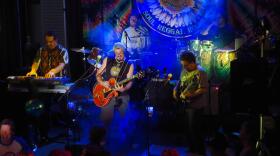Visitors who walk the Grand Canyon at dawn expect to find beauty and awe, but they don’t expect a grand piano perched on the rim. Musician Will Munroe is on a quest to play improvised music, from sunrise to sunset, in as many national parks and monuments as possible. It’s his way of calling for stewardship and protection of threatened public lands. For this installment of Eats and Beats, stories about food and music, KNAU brings you the sound of a grand piano in the nation’s grandest park.
Click on the audio file above to hear the music.
MUNROE: Initially it was a literal dream that I had, which was playing piano in Joshua Tree at a very specific location that I’d kind of, I must have remembered it since I was a kid. And it just so happened I was going to go with my dad anyway, he’s a photographer and he was going to take some pictures out there. We found the location. Then I just knocked on the door of the administrator’s office. I was frustrated with the EPA and Department of Interior’s treatment of the National Park Service and the contention that’s around land use, especially monuments, and he said, “Oh that sounds like a First Amendment issue. OK, in that case you don’t need to pay for it.” So we did the first performance on July 4. It was very surreal. Every time I do this it gets more and more surreal, and more and more emotional, and more and more important.
MUNROE: It’s not really entertainment, it’s art, and it’s not about us. Because it can’t be. I mean, look around us…. That’s what I love about the parks, is people come here on pilgrimages, whether they know it or not, they’re here to just be humbled and to find something they’re looking for.
MUNROE: I’m one of those musicians who was just born a musician. I stated playing piano when I was about five. I guess the music comes from a willingness to submit to the things around you, which is very difficult sometimes, especially when there’s so much minutiae involved with getting the music to a place, getting a piano off of a truck…. And it’s like, the more I think about it, it’s the perfect thing. Its meaning is despite all of our craftsmanship and ability to design incredible technology to express ourselves, it’s ultimately nothing compared to nature, what God can do. It’s crazy.
MUNROE: A lot of people don’t get a chance to be involved in art, especially in an unexpected way. And art should be for people. Not necessarily refined or put in museums. And it’s one of the those things where, where if you can distract somebody in a certain way, get them out of their head for one moment, there’s so much potential in that moment of awe. So this helps in getting people out of their sadness or their normal way of thinking.
MUNROE: To me it’s as simple as is this place beautiful? It is doing something for the human spirit that’s important to us? If that’s what it is, then yeah, it’s worth protecting….. I would like people to reflect on experiences of beauty that they’ve had in their life. And to think about how big the world is, how full of potential it is. Those two things together I think are the doors people go through, the windows to look through, to find greater meaning, not just in this project, this art, but in a lot of things. Beauty and hope. Yeah.








